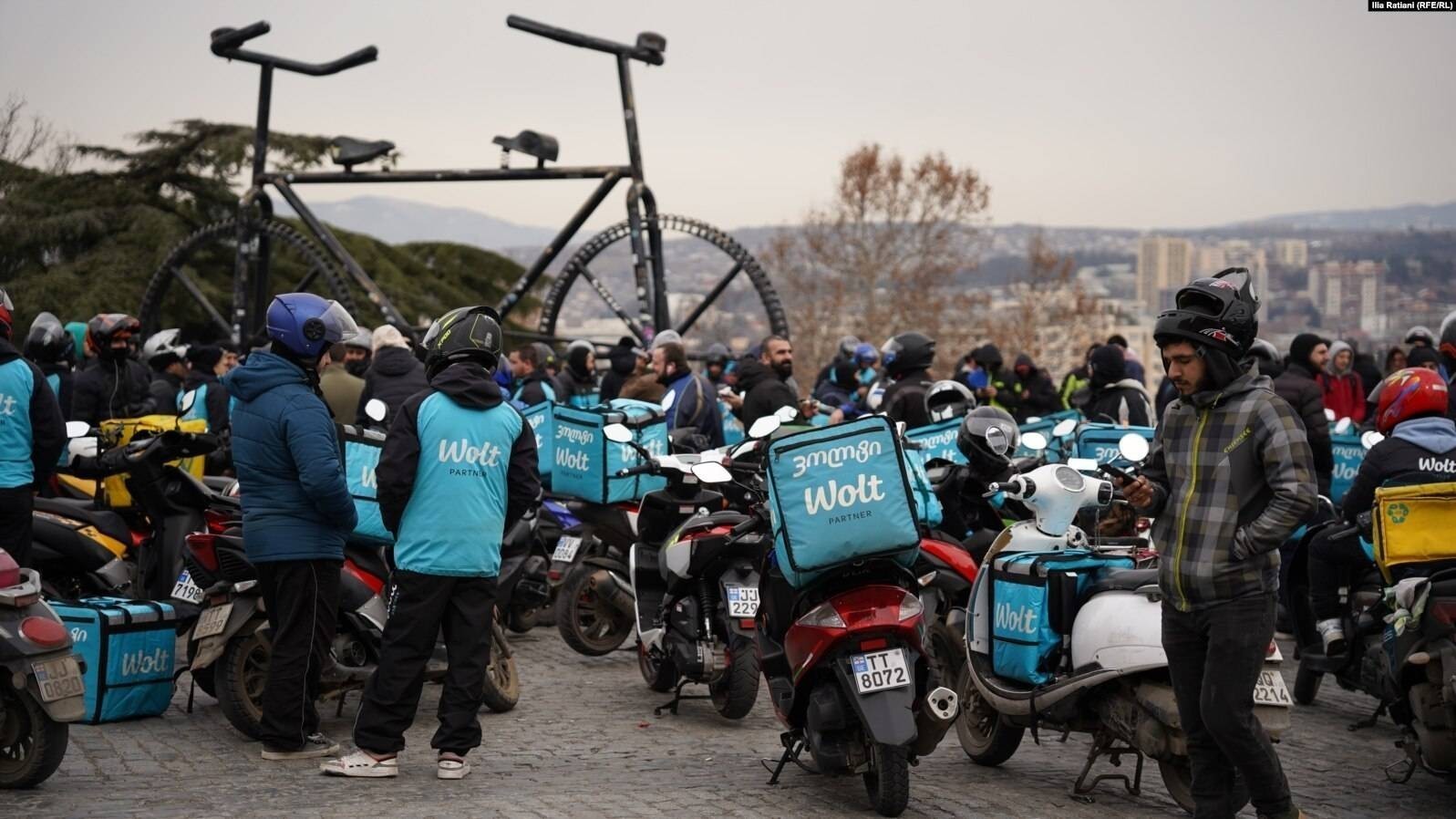საერთო ცხელი ხაზი +995 577 07 05 63


The Social Justice Center responds to the protest of Wolt couriers and considers that the recent events, which reveal the fundamental injustices typical for employment in the “platform” economy, should become an impetus for the state to examine the ways of ensuring the workers employed in this sector with labor and social guarantees and take concrete steps in this direction.
We would like to remind the public that at the protest action held on February 5, Wolt couriers demanded an increase in wages and the correction of bugs and errors in the application. According to them, the remuneration determined by the company’s tariff policy does not correspond to the harsh and life-threatening work that couriers have to perform. The protest of couriers continues until now, and they also applied to the Ombudsman for determining the fact of discrimination against them. According to the couriers, after protesting, they were notified by the company concerning the possible termination of the working relationship, which was perceived by them as a threat and an attempt to limit the freedom of expression.
Public should be aware that Wolt, as well as other delivery service companies operating in Georgia, do not consider couriers as employees. Therefore, companies sign partnership service agreements with them as “independent contractors”. In practice, this implies that from the perspective of the company, couriers are not considered employees and are not covered by the guarantees envisaged by the Labor Code of Georgia and the general legislative framework.
Additionally, despite the attempts of companies to disguise the labor relationship, following the international experience, it was recognized in Georgia as well that these cases concern labor agreements and not service contracts. More precisely, considering the factual circumstances (instead of the formal aspects of the contract), the Labor Inspection Office[1] and the Public Defender of Georgia[2] determined that the couriers are employees and not independent contractors; The elements of subordination, control, supervision and setting of working conditions in the legal relationship between the couriers and the company makes it an employment relationship. However, employees in this sector remain outside the social protection systems and are not covered by the guarantees foreseen by the labor law, such as paid leave, sick, leave, etc.
It is noteworthy, that the recent significant growth of the so-called “gig”/platform economy[3] has made the working conditions of the employees in this sector as a new challenge. Due to flexible schedules and relatively competitive wages in the labor market, employment in the platform economy has become acceptable to many; however, as recent events show, the burdensome work of couriers is not properly compensated, inter alia, as they routinely have to perform unpaid tasks (such as tasks concerning the waiting time and work done during an order cancellation), which has become a normalized practice in this sector.
It is important to note, that autonomy and flexible schedule are often cited as advantages of the “gig” economy, although the algorithm-based system significantly limits the autonomy of workers.[4] Algorithms employed by platform companies use data that is neither accessible nor controlled by the workers. The rating of couriers, the evaluation system, as well as the decisions on “blocking” within the platform, are based on the data processed by the algorithms, which cannot be disputed by the courier.[5]
In addition, it is important to consider the fact that the company sets the tariff unilaterally, without consulting the couriers, while the workers are not given the opportunity to influence the above-mentioned decision.[6] We believe, that the practice of setting and changing the tariff by the company in a unilateral manner and without any agreement with the couriers, makes employees completely dependent on the company; Therefore, the tariff policy should be transparent and fair, and the couriers should have information on each “price element”, while the final tariff should be predictable and subject to verification.
Considering the above-mentioned, we call for:
[1] Ministry of Internally Displaced Persons from Occupied Territories, Labor, Health and Social Affairs of Georgia, Protocol of Administrative Offence, 11th of March 2022, available at: https://bit.ly/3CEoE0w.
[2] Recommendation of the Public Defender of Georgia “On the Establishment of the Direct Discrimination in Labor Relations on the Basis of Different Opinion”, June 14, 2021, https://bit.ly/3xCjcIU
[3] “Galt & Taggart”, “E-commerce in Georgia”, July 20, 2021, https://bit.ly/3KIaemz.
[4] World Employment and Social Outlook 2021: The role of digital labour platforms in transforming the world of work, International Labour Office, 2021. http://bitly.ws/bTzn.
[5] The regulation adopted in the EU in 2019 obliges the online “intermediary” companies to provide the contractor with information about the grounds for decision when suspending/terminating the contract; According to the same regulation, clear parameters affecting the rating of contractors must be defined in advance by the company. See., Regulation (EU) 2019/1150 of the European Parliament and the Council of 20 June 2019 on promoting fairness and transparency for business users of online intermediation services, 2019, https://bit.ly/3Kqw7Hb.
[6] According to the information available to us, under the contract, the courier can terminate the labor relationship if the new tariff introduced by the company is unacceptable, while it is not possible to continue working with the previously determined tariff.
The website accessibility instruction